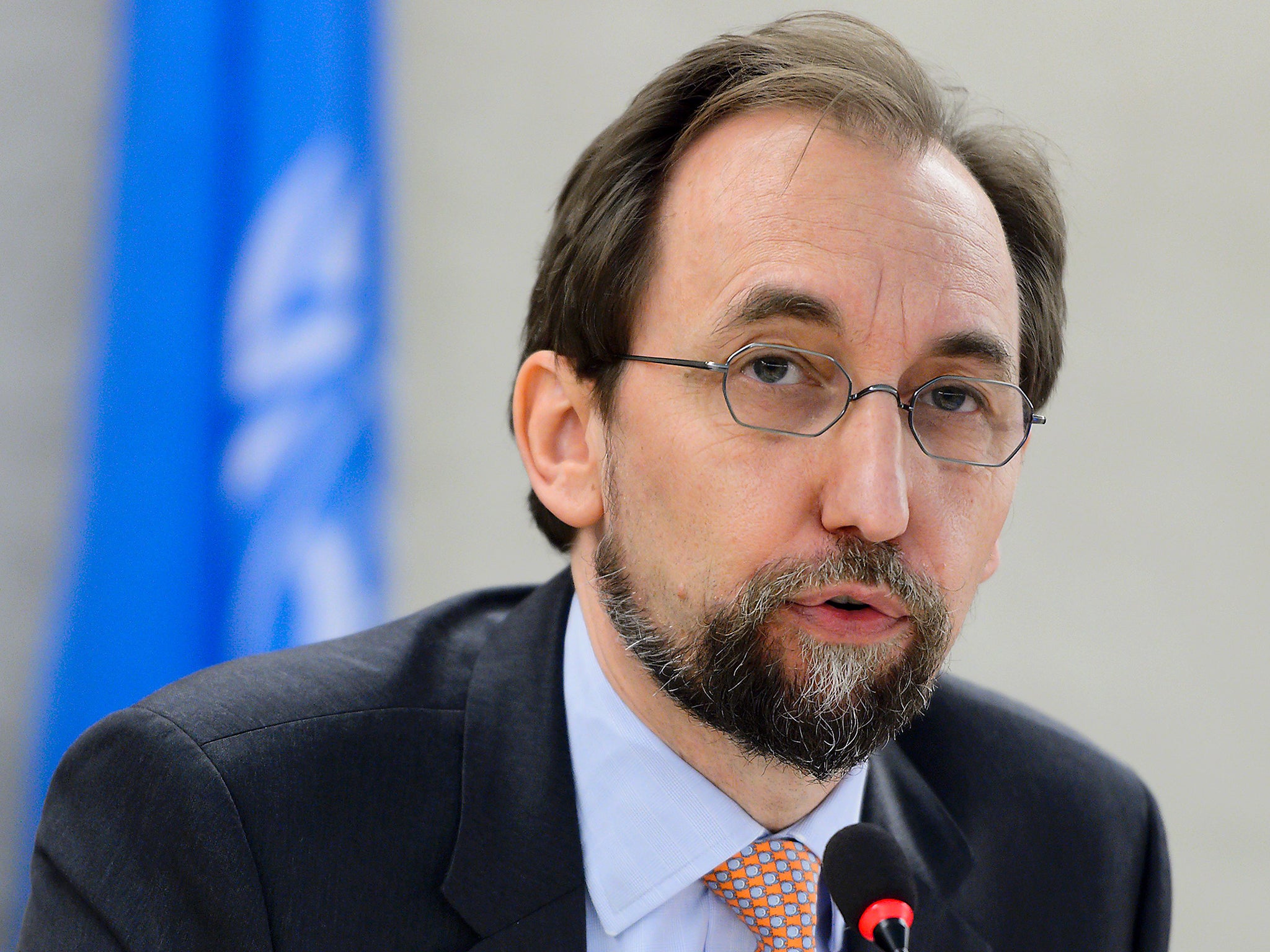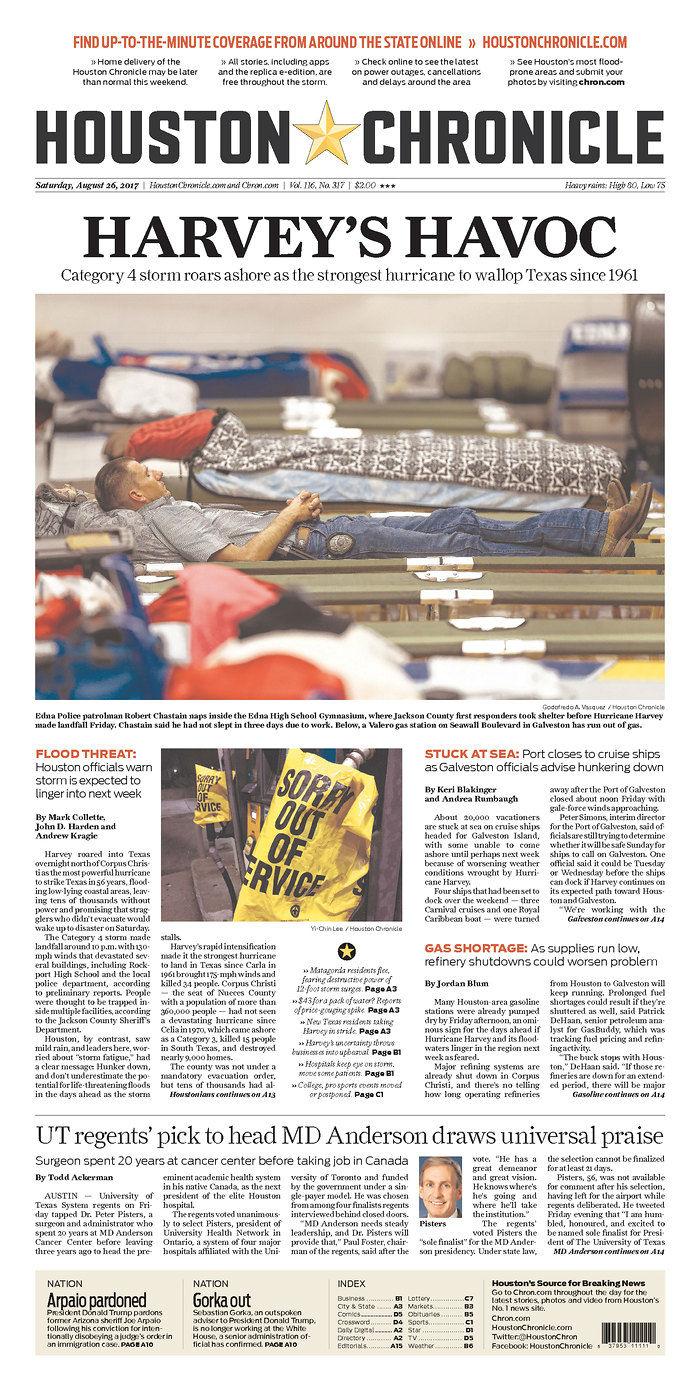Donald Trump's 'crooked' and 'fake' media slurs crumble as reporters excel chronicling Hurricane Harvey
Most reporters are plenty tough enough to see the Trump attacks for what they are, reflections of his own insecurity and candy-bombs for his slowly eroding voter base. But thick skins aren’t what make reporters great. We need a thin skin too, to grasp, feel and properly describe all that is good and terrible in the world
Even as the American news media committed serial heroics delivering the best possible reporting of Hurricane Harvey in dire conditions last week, one Trump found time to impugn it. That was Eric predicting on Twitter that among news outlets only Fox would bother to report on Thursday that his father had just donated $1m of his own money to the relief effort.
“So proud!!! Let’s see if @CNN or the #MSM acknowledges this incredible generosity. My guess: they won’t...” Eric Trump tweeted with a link to a Fox News story, referring not just to CNN, his father’s least favourite 24-hour cable channel, but also to the so-called “mainstream media” in general.
The President’s second son, however, was as sloppy as the coverage of Harvey has been exemplary. And he was called out for it. He posted his tweet precisely three hours after CNN had also used Twitter to highlight its reporting precisely of his father’s gesture.
Sloppy but predictable. The media paranoia inside Trump World knows no bounds. The rebuke Trump got from almost all sides, even from anchors at Fox, after his failure clearly to condemn the white supremacists and neo-Nazis who bought chaos and murder to the streets of Charlottesville last month has only served to deepen his personal sense of victimhood.
Such has been the ferocity of President Trump’s war on the media and “fake news” – at a huge rally in Phoenix before Harvey made landfall he called all journalists “truly dishonest people” who are guilty of perpetrating “crooked media deceptions” against him – that last week even the UN Human Rights Chief, Zeid Ra‘ad al-Hussein, felt the need publicly to sound the alarm.
“It’s really quite amazing when you think that freedom of the press, not only sort of a cornerstone of the US Constitution but very much something that the United States defended over the years, is now itself under attack from the President,” al-Hussein told reporters in Geneva. “It’s sort of a stunning turnaround. And ultimately the sequence is a dangerous one.”
Al-Hussein worried that the Trump torpedoes might be encouraging governments around the world to muzzle the free press as well as acts of violence against reporters. “I believe it could amount to incitement. At an enormous rally, referring to journalists as very, very bad people – you don’t have to stretch the imagination to see then what could happen to journalists.”
Most reporters are plenty tough enough to see the Trump attacks for what they are, reflections of his own insecurity and candy bombs for his slowly eroding voter base. But thick skins aren’t what make reporters great. We need a thin skin too, to grasp, feel and properly describe all that is good and terrible in the world. So, yes, it has never felt good to belong to one of the least respected professions in the land, alongside lawyers. Trump is only making that worse.
Which may explain why the American print media, in particular, has taken unusual steps to share with readers the commitment and courage of their reporting teams as they have waded directly into the floodwaters of Houston to carry out their duties. The message is clear. There was nothing fake about Harvey and nothing crooked about the writers and editors who have been tirelessly reporting it. Show them some respect, even.

A page two story in The New York Times on Thursday, headlined “How The Times Covered Harvey” offered snippets of the travails of its reporters, like energy reporter Clifford Krauss, who kept reporting even as his own home succumbed to the deluge. Julie Turkewitz had a moment waist-deep in water meeting a man with a machete to ward off snakes and crocodiles. Colleague Alan Blinder shared the anguish any reporter who has covered a natural disaster will recognise. “Even when you’re tired you wake up in the night wondering if you’ve missed something,” he told his own paper. “You wake wondering what else is going on out there”.
We are learning a lot, likewise, about how the Houston Chronicle coped –and excelled – thanks in part to a Facebook posting by one of its own, Susan Carroll, an investigative reporter, that was quickly picked up by the Poynter Institute, which exists to nurture and protect the freedom of the press, and wrapped into its story “How the Houston Chronicle is covering the city’s historic disaster”. Some of what Carroll shared was how staff made it into work through the floods and got home again.
“Vernon Loeb ran a couple miles from his house to the newsroom this morning during the flood because the roads were impassable. He honestly didn’t seem to think twice about it,” Carroll related in her original post. And later: “Mark Collette finally made it home to Meyerland on a jet ski, wearing another man’s shorts.”

Other insider tales include how the Chronicle delivered 4,000 free copies of the newspaper to the main shelter inside the George R Brown Convention Centre so those stranded could get a sense of what was going on outside its walls and in the neighbourhoods they had been forced to abandon, and how staff members of the Houston bureau of The Washington Post did a whip round and delivered almost 250 doughnuts to their exhausted colleagues over at the Chronicle.
Reporters are usually averse to inserting themselves in their stories. But when their own President is calling them scumbags on an almost daily basis the rules change a little. Credit where credit is due.
Join our commenting forum
Join thought-provoking conversations, follow other Independent readers and see their replies
Comments
Bookmark popover
Removed from bookmarks